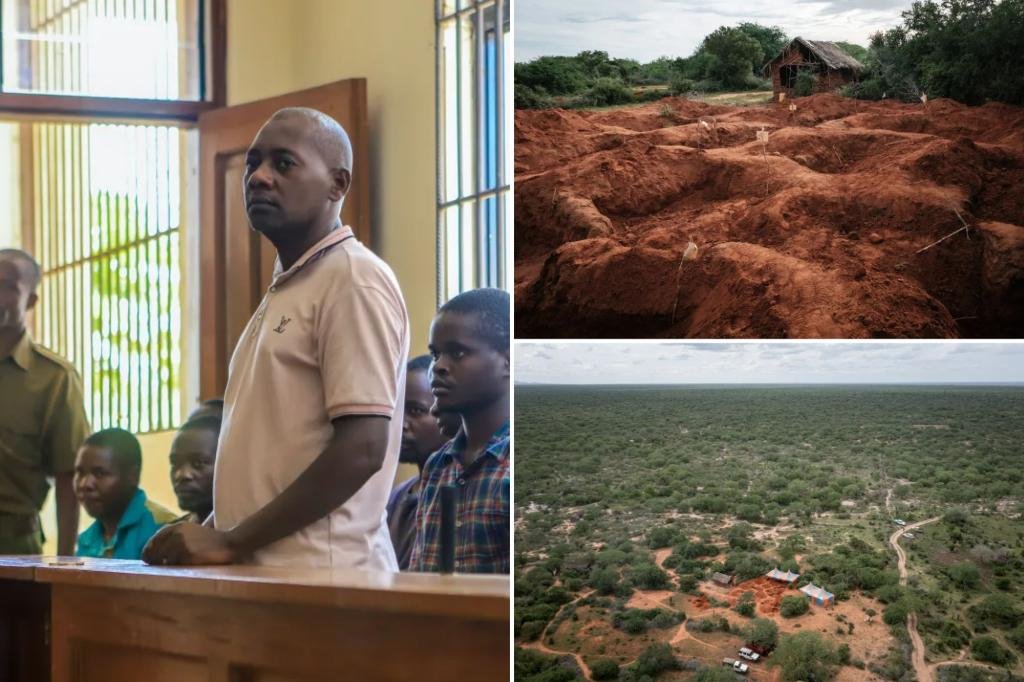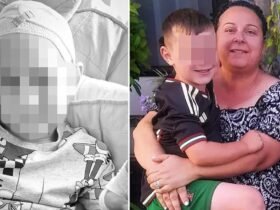Survivors of a Christian sect in Kenya are still haunted by the massacre of hundreds of members, many of whom were persuaded by their extremist leader to starve themselves in anticipation of the end of the world.
At least 436 bodies have been recovered since police raided the Good News International Church deep in the forest, about 40 miles from the coastal town of Malindi, 17 months ago in one of the deadliest cult-related massacres ever.
The church’s Doomsday pastor, Paul Mackenzie, has pleaded not guilty to the murders of 191 children, multiple counts of manslaughter and other heinous crimes.
If convicted, he faces life in prison.
The charismatic preacher rose to national fame because he reportedly performed miracles and exorcisms and could be generous in sharing the wealth he amassed with his followers, who included teachers, police officers and others from across the Christian-dominant country.
“As a religious leader, I see Mackenzie as a very mysterious man because I cannot fathom how he could have killed all those people in one place,” said Famau Mohamed, a sheikh in Malindi.
“But one thing that is still a mystery even now is that he still talks with such courage. … He feels like he hasn’t done anything wrong.”
Mackenzie, a former street vendor and taxi driver with a high school education, apprenticed with a pastor in Malindi in the late 1990s and opened his own church there in 2003.
As his power and influence grew, other preachers and leaders began to sound the alarm about his teachings. He first appeared on the government’s radar after opposing formal education and vaccinations.
He was arrested in 2019 for opposing government efforts to issue national identification numbers to citizens, claiming the numbers were satanic. He closed his church in Malindi and urged his congregation to follow him to Shakahola, where he leased 800 hectares of forest inhabited by elephants and big cats.
In Shakahola, church members paid a small fee to own plots of land where they had to build houses and live in villages with Biblical names such as Nazareth, survivors said.
But Mackenzie became more demanding as he led his own mini-state, where people from different villages were completely cut off from each other, said former church member Salama Masha.
“What made me (realize) that Mackenzie was not a good person was when he said the children had to fast to die,” said Masha, who fled the community after witnessing the starvation of two children.
“That’s when I knew this wasn’t something I could do.”
Mackenzie settled in a thatched-roof house with a solar panel known as ‘ikulu’, or state house. He surrounded himself with personal bodyguards and informants and proclaimed himself the prophetic ‘paapa’ to his thousands of loyal followers.
Police found milk and bread in Mackenzie’s refrigerator, while dozens of them starved to death nearby. Authorities rescued 15 emaciated parishioners during the raid on the building last year.
“(He is) like a chief because they had a small village and my brother is the eldest of that particular village,” said Robert Mbatha Mackenzie, speaking of his older brother’s authority in Shakahola.
‘He went there and in just two years he built a large village. And many people followed him there.”
A former church member who escaped from Shakahola said she lost faith in Mackenzie when she saw his men dealing with people on the brink of starvation. She said Mackenzie’s security team would simply whisk the person away, never to be seen again.
The bodyguards would rape women in the villages “as a routine,” said the woman, who was not identified, before revealing that she had been sexually abused by four men while pregnant with her first child.
Those caught trying to escape the violence through the dense bush faced beatings – as did those who broke their fast, survivors said.
Autopsies on more than a hundred bodies discovered in shallow graves showed deaths from starvation, strangulation, asphyxiation, and blunt force injuries.
Shukran Karisa Mangi, a gravedigger, said he believed more mass graves were yet to be discovered in Shakahola.
He is still disturbed by the sight of the mutilated body of a friend in one of the graves, with his head and torso turned in the opposite direction.
“He died in a very cruel way,” Mangi said. “Most of the time I still think about how he died.”
At least 600 people are reported missing, according to the Kenyan Red Cross.
Priscillar Riziki, who left Mackenzie Church in 2017, lost her daughter and three grandchildren in Shakahola.
The heartbroken grandmother broke down as she remembered Mackenzie as “good at first” but getting harder and harder. Her daughter Lorine was not allowed to take her children on family visits without Mackenzie’s permission, Riziki said.
One of Riziki’s grandchildren was identified through DNA analysis and given a proper burial. Lorine and two of her children are presumed dead.
Witnesses said Mackenzie’s apocalyptic vision was amplified during the COVID-19 pandemic, with the leader ordering stricter fasts. According to former members, parents were forbidden to feed their children.
Some of those who managed to flee began to spread the news of the suffering in Shakahola.
An attempted rescue mission by outsiders on motorcycles resulted in a fight. According to village elder Changawa Mangi Yaah, two motorcycles belonging to the party were set on fire.
However, the police could not go further than making short arrests.
Yaah said he then realized that “Mackenzie was more powerful than I thought.”
With Postal Wires












Leave a Reply